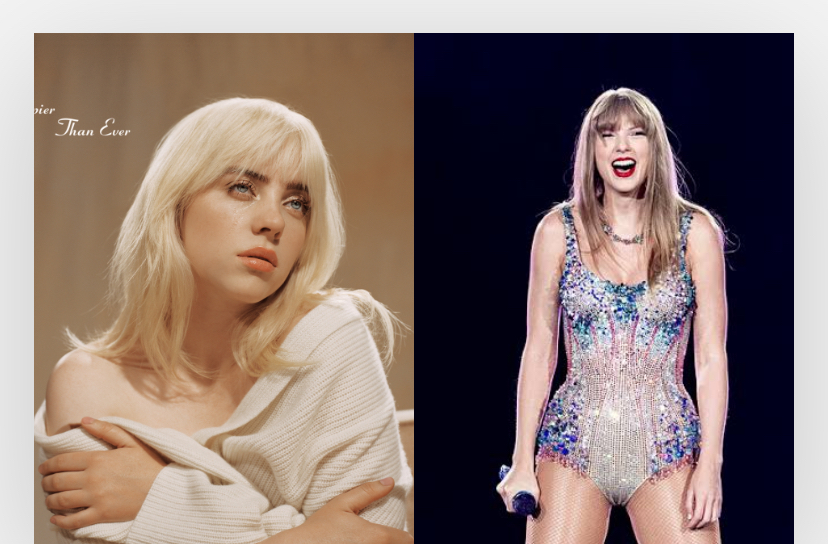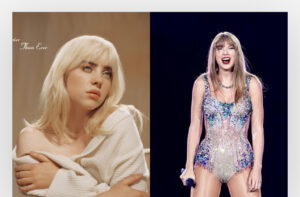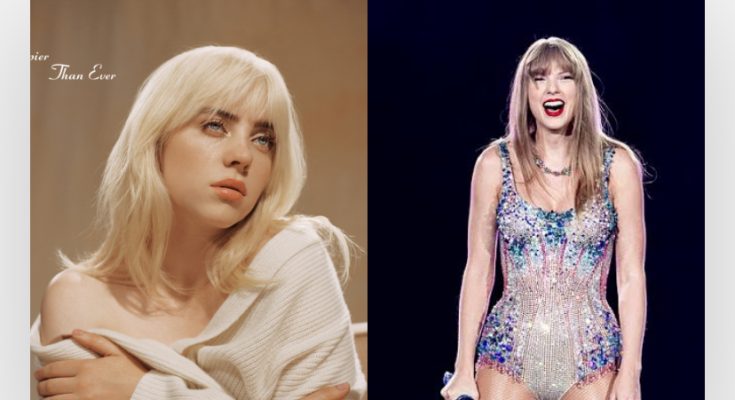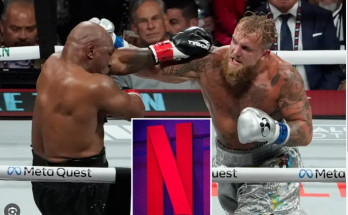“Uninteresting, repetitive and entirely basic, Swift’s music is brain-numbingly banal and it’s what I’ll listen to if i had the intellect of a very small worm— Billie Eilish blows hot on Taylor Swift

The recent epic drama between Kendrick Lamar and Drake may have made the brutal diss track trendy again, but in the pop realm, indirect shade-throwing seems to be the order of the day.

When the clash involves two of the biggest pop stars alive, and their mighty fandoms are the ones decoding their insinuations, even subtle or unintentional slights can become amplified to the point of absurdity.
Yet that also leaves the rest of us asking what is and isn’t real. Are Billie Eilish and Taylor Swift really feuding? From a certain angle, it certainly seems like Eilish has spent the past couple of months using her promotional cycle for her new album, Hit Me Hard and Soft, to drop casual but pointed criticism at Swift. From another angle, it seems like Swift may have retaliated in her own Swiftian way — by releasing bonus editions for her new album, Tortured Poets Department, timed to compete with Eilish’s album release.
While Swift’s reputation for petty feuding is so well known that she made a whole album about it, this fight seems totally out of character for the notably laid-back Eilish. Yet it seems to have been Eilish whose thinly veiled barbs against Swift first gained notice and steadily fueled the fire. Have we entered an era where fans look to turn everything into an epic rivalry — and they’ll find a way to do it, even when there’s nothing there at all?
Or is the Eilish/Taylor beef — with layered jibes leading to battles waged by fandom foot soldiers on social media feeds across the internet — just how pop stars fight these days?
The drama is all about which album tops the Billboard chart — but it’s also about shade
At the heart of this feud is the Billboard album chart. Swift’s Poets has been at the top since its April 19 release, and Swifties have a single-minded goal of keeping it up there as long as possible. One of the ways artists gamify the charts in a highly competitive digital age is by releasing variant album editions — a trick Swift is well-known for using. For Poets, she released a standard album, then immediately expanded it to a double album with 30 songs, then suddenly dropped three more surprise, limited-time album variants on May 17.
To Eilish fans, the timing of these three new album drops was sus: They landed the same day as the release of Eilish’s own new album, Hit Me. Swifties argued the timing was purely coincidental — just one more way of boosting Swift’s goal of keeping her album at No. 1 for as long as possible. For Eilish stans (who don’t have a collective name, oddly enough), that explanation fell flat: If the timing didn’t matter, why did Taylor step on Eilish’s release date? Especially since they were limited editions, meaning fans had a narrow window of time to buy them — a window of direct competition with Eilish.
For their part, Swift’s fans were side-eying Eilish’s camp: They soon realized Eilish’s manager, Danny Rukasin, had liked and retweeted (and hastily deleted) a tweet implying that Swift had a long history of intentionally “blocking” other artists’ paths to the top of the chart by strategically dropping her own releases. The calendar is finite, so Swift’s releases are likely to be less about spiting other artists and more about limited space, and Rukasin may have been motivated less by this particular gripe and more by a general dislike of Swift as an artist. Fans soon dug up another instance when he shaded Swift on social media, which fed the flames of hostility between the two camps.
Meanwhile, both artists waged a back-and-forth with competing bonus editions of new tracks throughout the week, in an effort to cinch the top. Ultimately, Swift retained the No. 1 spot, with Eilish slotting in at No. 2.
Of course, all of this might easily have been chalked up to unfortunate coincidence, inevitable competition, and heated emotions rather than beef — nothing that really rises to the level of a full-blown, two-sided conflict.
But what fandom these days thrives on a lack of conflict? It’s easy to see why neither fandom has backed off the drama. You don’t have to dig deep to find evidence that the beef might be real, and that Swift might have intended to go head-to-head with Eilish. That’s because Eilish might have been sitting on some longtime animosity toward Swift — a resentment that could have started with another artist altogether.
If this feud exists, it might have started, not with Eilish or Swift, but with a man’s garden-variety sexism
To find the source of this mess, we might have to jump back to 2022. Damon Albarn, the frontman of seminal British bands Blur and Gorillaz, kicked off the year by bizarrely bashing Taylor Swift’s songwriting ability. In a January interview with the Los Angeles Times, Albarn first flatly claimed that Swift “doesn’t write her own songs,” then doubled down by adding that she doesn’t even co-write her own songs. Since Taylor Swift’s primary claim to fame is her songwriting ability, this was a very odd — if not outright misogynistic — hill for Albarn to randomly die on.
But within almost the same breath, he took things in an even weirder direction, by comparing Swift’s music to that of Billie Eilish and her brother Finneas O’Connell, with whom Eilish frequently co-writes:
I’m not hating on anybody, I’m just saying there’s a big difference between a songwriter and a songwriter who co-writes. Doesn’t mean that the outcome can’t be really great. … A really interesting songwriter is Billie Eilish and her brother. I’m more attracted to that than to Taylor Swift. It’s just darker — less endlessly upbeat. Way more minor and odd. I think she’s exceptional.
For all we know, the incident could have ended there — Albarn apologized to Swift after massive backlash, blaming the Times for “clickbait”-editing whatever he actually said.
Eilish holding a camera, filming O’Connell on the floor of the Kia Forum.
Billie Eilish and Finneas O’Connell at the listening party for her new album Hit Me Hard and Soft at the Kia Forum on May 16, 2024, in Inglewood, California. Emma McIntyre/Getty Images for ABA
However, fast-forward a few months, and Billie Eilish herself took things a step further. During her history-making gig at Coachella, where she was the youngest headliner in history, Eilish brought out Albarn for a surprise guest performance. This could have been a purely fannish gesture on Eilish’s part. However, while Eilish was praising Albarn and the influence he had on her own music, an unidentified male voice on a hot mic could be heard on the concert livestream joking, “We’re getting sued by Taylor Swift.”
At the time, Swifties leaned toward the culprit behind the voice being Eilish’s brother O’Connell. Fans seemed torn on whether or not to view this as deliberate shade toward Taylor on the part of Eilish and O’Connell: After all, O’Connell had previously praised Swift’s songwriting as “inspiring,” and he attended her birthday party in 2021.
Still, it’s easy for things to get twisted in the cutthroat game of entertainment, and we know how Swift can hold a grudge when she feels her art has been disrespected. And judging by multiple comments Eilish has made in the promotional cycle for Hit Me Hard and Soft — comments that certainly seem to be directed at Swift — the vendetta might go both ways.
Eilish can’t seem to stop shading Swift — or are fans just reading into things?
On March 23, weeks before Swift’s Poets release, Billboard published an interview with Eilish in which she spoke of the “wasteful” practice of artists releasing vinyl albums primarily to garner more album sales and secure longevity or higher sales rankings on the Billboard charts. Although the entire interview was about Eilish’s broader efforts to promote environmental sustainability, she was especially sharp in her criticism of this (admittedly, yes, wasteful) practice:
I find it really frustrating as somebody who really goes out of my way to be sustainable and do the best that I can and try to involve everybody in my team in being sustainable — and then it’s some of the biggest artists in the world making f–king 40 different vinyl packages that have a different unique thing just to get you to keep buying more. It’s so wasteful, and it’s irritating to me that we’re still at a point where you care that much about your numbers and you care that much about making money — and it’s all your favorite artists doing that sh-t.
Since, again, this is a tactic for which Swift is famous, fans read the entire sidebar as a swipe at Swift specifically. Eilish herself quickly responded via Instagram and denied that she’d intended to slight any specific artist. “It would be so awesome if people would stop putting words into my mouth,” she reportedly wrote. “I wasn’t singling anyone out.”
If this had been a one-off statement, it would probably have been easier for fans to believe Eilish. Instead, this was just the beginning of a string of moments when Eilish’s general complaints could also be read as specific criticism of Taylor Swift. It’s worth noting that each of these subsequent interviews came after Swift’s May 17 “block” of Eilish’s album, so it’s also possible that what started out as pure coincidence on Eilish’s part quickly became personal.
In a May 21 interview for Apple Music, Eilish drew still more attention for remarks that seemed to shade overtly autobiographical songwriting — you know, like the kind Swift is again notorious for.
“I really wanted the songs to not be like, ‘Oh, I know what that’s about,’” Eilish says.
I think that we live in such a world where everyone knows everything … Everyone is aware of the beef that happened and aware of the people that don’t like each other and aware of this and that.
People put songs out, especially in the pop world — and I’m not saying there’s anything wrong with it necessarily, but it’s just, we live in a world of, like, somebody puts a song out and everyone’s like, ‘So this is who this is about and this is the entire story of what happened,’ and it’s like, it doesn’t even give the listener a chance to interpret it how they want to interpret it and how they naturally hear it. And that I find really frustrating. I don’t want to hear a song that I’m like, ‘Ooh, my god’ — every single lyric, I’m like, ‘Oh, my god, this is about that person.’
At this point, her brother, O’Connell, chimes in, agreeing, “No, it can be gross … I don’t listen to ‘The Luckiest’ by Ben Folds and think about his wife. I think about who I’m in love with.”
Taken by itself, this is all pretty innocuous kvetching about the creative process. But taken as part of an ongoing pattern of the siblings subtly shading Swift, her songwriting, and her production process, it feels a lot more damning.
Oh, and then Eilish apparently added Swift-style performances to the checklist of things she doesn’t like.



